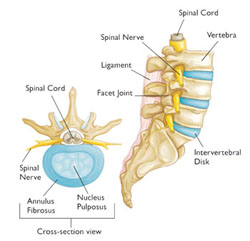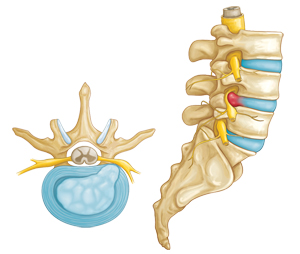Switch to Herniated Disk Treatment in Arlington, VA
What is a Herniated Disc?
When people say they have a “slipped” or “ruptured” disc in their neck or lower back, what they are actually describing is a herniated disc (sometimes also spelled disk) which is a common source of pain in the neck, lower back, arms, or legs.
Anatomy
Discs are soft, rubbery pads found between the hard bones (vertebrae) that make up the spinal column. The spinal canal is a hollow space in the middle of the spinal column that contains the spinal cord and other nerve roots. The discs between the vertebrae allow the back to flex or bend. Discs also act as shock absorbers.
Discs in the lumbar spine (low back) are composed of a thick outer ring of cartilage (annulus) and an inner gel-like substance (nucleus). In the cervical spine (neck), the discs are similar but smaller in size.
Cause of A Herniated Disc
A disc herniates or ruptures when part of the center nucleus pushes through the outer edge of the disc and back toward the spinal canal. This puts pressure on the nerves. Spinal nerves are very sensitive to even slight amounts of pressure, which can result in pain, numbness, or weakness in one or both legs.
Herniated Disc Risk Factors/Prevention
In children and young adults, discs have high water content. As people age, the water content in the discs decreases, and they become less flexible. The discs begin to shrink and the spaces between the vertebrae get narrower. Conditions that can weaken the disc include:
- Improper lifting
- Smoking
- Excessive body weight that places added stress on the discs (in the lower back)
- Sudden pressure (which may be slight)
- Repetitive strenuous activities
Symptoms of a Herniated Disc
Lower Back Pain
Low back pain affects four out of five people. Pain alone is not enough to recognize a herniated disc. See your doctor if back pain results from a fall or a blow to your back. The most common symptom of a herniated disc is sciatica—a sharp, often shooting pain that extends from the buttocks down the back of one leg. It is caused by pressure on the spinal nerve. Other symptoms include:
- Weakness in one leg
- Tingling (a “pins-and-needles” sensation) or numbness in one leg or buttock
- Loss of bladder or bowel control (if you also have significant weakness in both legs, you could have a serious problem and should seek immediate attention).
- A burning pain centered in the neck
Neck Pain
As with pain in the lower back, neck pain is also common. When pressure is placed on a nerve in the neck, it causes pain in the muscles between your neck and shoulder (trapezius muscles). The pain may shoot down the arm. The pain may also cause headaches in the back of the head. Other symptoms include:
- Weakness in one arm
- Tingling (a “pins-and-needles” sensation) or numbness in one arm
- Loss of bladder or bowel control (If you also have significant weakness in both arms or legs, you could have a serious problem and should seek immediate attention.)
- Burning pain in the shoulders, neck, or arm
Herniated Disc Diagnosis
To diagnose a herniated disc, your doctor will ask for your complete medical history. Tell him or her if you have neck/back pain with gradually increasing arm/leg pain. Tell the doctor if you were injured.
A physical examination will help determine which nerve roots are affected (and how seriously).
A simple X-ray may show evidence of disc or degenerative spine changes.
MRI (magnetic resonance imaging) or CT (computed tomography) (imaging tests to confirm which disc is injured) or electromyography (a test that measures nerve impulses to the muscles) may be recommended if the pain continues.
Treatment Options for a Herniated Disc
Nonsurgical Treatment
Nonsurgical treatment is effective in treating the symptoms of herniated discs in more than 90% of patients. Most neck or back pain will resolve gradually with simple measures.
- Rest and over-the-counter pain relievers may be all that is needed.
- Muscle relaxers, analgesics, and anti-inflammatory medications are also helpful.
- Cold compresses or ice can also be applied several times a day for no more than 20 minutes at a time.
- After any spasms settle, gentle heat applications may be used.
Any physical activity should be slow and controlled, especially bending forward and lifting. This can help ensure that symptoms do not return-as can taking short walks and avoiding sitting for long periods. For the lower back, exercises may also be helpful in strengthening the back and abdominal muscles. For the neck, exercises or traction may also be helpful. To help avoid future episodes of pain, it is essential that you learn how to properly stand, sit, and lift.
If these nonsurgical treatment measures fail, epidural injections of a cortisone-like drug may lessen nerve irritation and allow more effective participation in physical therapy. These injections are given on an outpatient basis over a period of weeks.
Surgical Treatment
Surgery may be required if a disc fragment lodges in the spinal canal and presses on a nerve, causing significant loss of function. Surgical options in the lower back include microdiscectomy or laminectomy, depending on the size and position of the disc herniation.
In the neck, an anterior cervical discectomy and fusion are usually recommended. This involves removing the entire disc to take the pressure off the spinal cord and nerve roots. Bone is placed in the disc space and a metal plate may be used to stabilize the spine.
For some patients, a less invasive surgery may be performed on the back of the neck that does not require fusing the bones together.
Each of these surgical procedures is performed with the patient under general anesthesia. They may be performed on an outpatient basis or require an overnight hospital stay. You should be able to return to work in 2 to 6 weeks after surgery.
Testimonial for Dr. Eric J. Feuchtbaum, Back Surgeon at OrthoBethesda
I recently had cervical spine surgery with Dr. Eric Feuchtbaum. Dr. Feuchtbaum is an excellent surgeon. He explains things carefully and listens thoughtfully. My surgery was a success-I am completely without nerve pain. Dr. Feuchtbaum called me at home personally the day after discharge. He was very receptive to questions and always listened when I had a concern. I highly recommend Dr. Feuchtbaum! – J.M.
Call OrthoBethesda in Bethesda, MD, to Schedule an Appointment Today
The skilled and compassionate orthopedic team at OrthoBethesda in Bethesda, MD, understands how painful it can be to suffer from disc herniation. Your spine is the most important part of your body. Whether you require surgery, physical therapy, anti-inflammatory medications, or a minimally-invasive procedure; our team can help you deal with the injuries you have suffered. Call us today at (301) 530-1010 to schedule an appointment with a spine surgeon.
Further Reading
How to Know if You Have a Herniated Disc
How to Sleep With a Herniated Disc
 ">
">
Contact OrthoBethesda for Herniated Disk Treatment Today
OrthoBethesda is proud to offer many treatment options for our patients who need quality orthopedic treatment for their herniated disk. Contact us for treatment or call us at (301) 530-1010 today!



